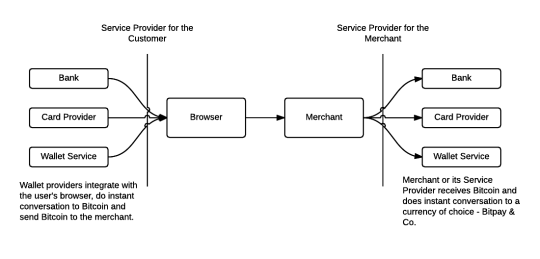First online payments happened before SSL was officially released and browsers could not make secure connections. A custom client had to be used to transfer the card details securely from the customer to the merchant. That was around 1994. Today 90% of online transactions in the US are card payments. The international numbers are probably lower with significant higher numbers for local, alternative payment methods. But the concept is all the same:
The customer transfers some information (card details, account numbers, etc.) to the merchant which uses a service provider (PSP) to pull money from the customer’s account through all the middle-men (acquirer, card network, banks,..) using that information. (or, in case both merchant and customer use the same wallet provider a closed loop transaction is done (for example PayPal).
To allow customers to pay with their payment option of choice merchants have to ideally integrate all options. Obviously a huge effort for the merchant. And many merchants only accept card payments leaving unserved all the people without cards. Crappy payment usability is probably still one of the main conversion killers.
But: value should be transferred instead of information
Since Bitcoin we have a rather widely adopted option of transferring digital value directly between two parties. Which means we actually no longer have to transfer payment information in order to pay.
One idea that I think has too little attention is the need for better integrations of wallets into browsers.
This would allow us to move the payment method selection to the client. Imagine your bank or card provider gives you a tool to pay online. Basically a tool that understands the bitcoin payment protocol and does the transaction for you. Any company could provide their customers such a solution (possibly even with additional services like dispute mediation, insurance, etc.).
No longer the merchant decides which payment instruments their customers must have access to but the customer chooses the favorite one - as long as it can transfer value in the defined standard to the merchant.
For the merchant it will be way easier to integrate payments, no need to integrate a broad range of payment options. It comes with usability improvements for the customer.
This is not a new idea, and has probably been around since the ecash times. But with Bitcoin for the first time a increasingly, widely adopted standard for digital value exchange exists. It makes it possible to transfer “money” directly instead of some information how to access the money.

W3C payment standardization process
Since years there has been activities around the W3C to standardize the web payment process which would make it easier for merchants to integrate payments as well as improving the usability for customers. The whole activities has imho been/is a bit confusing with many working groups, interest groups, task forces, competing standards, etc. but probably I just know to little about the W3C works ;)
I think it is super important that the payment flows become standardized, even though it seems the focus ist still on transferring payment information.
There has been a lot of activity lately at the web payments working group which is worth following. Also very - maybe even more interesting - is the Interledger payments community group.
tl;dr: let’s move the payment method selection from the merchant’s site to the client and transfer value directly and not stupid payment information (like card details).
